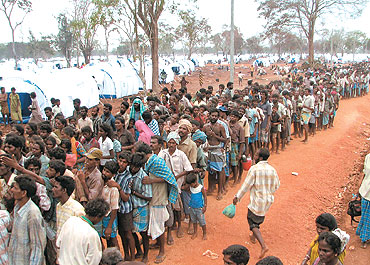As dark clouds loom, refugees seek silver lining
 The Tamil month of Aipassi falls between mid-October and the middle of November and brings the first showers of the northeast monsoon to many parts of northern Sri Lanka. This year for the 2.5 lakh Tamil refugees staying in flimsy United Nations and Chinese tents and eating watery sambar and rice in the northern district of Vavuniya, it threatens to bring flood and disease as well.
The Tamil month of Aipassi falls between mid-October and the middle of November and brings the first showers of the northeast monsoon to many parts of northern Sri Lanka. This year for the 2.5 lakh Tamil refugees staying in flimsy United Nations and Chinese tents and eating watery sambar and rice in the northern district of Vavuniya, it threatens to bring flood and disease as well.
A splash of unseasonal rain few weeks ago left some of the camps flooded, the ground squishy and forced many refugees to keep standing for hours till the water receded.
Sri Lanka’s army defeated the last Liberation Tigers of Tamil Eelam (LTTE) forces in May, ending the group’s 26-year-old fight for a separate Tamil homeland. Thousands of Tamils fled the fighting.
A majority of the displaced Tamils are in the largest Menik Farm refugee complex in Vavuniya, manned by military and police personnel. Movement of the internally displaced persons (IDPs) is severely restricted. Outsiders (including journalists) are banned from going inside the camps. Many refugees have been staying in the camps since February when they began to move out of LTTE-controlled areas and into government-run camps.
About 15,000 IDPs have been released since August. Another 3,300 were released —only to be taken into another closed refugee camp in Jaffna.
“Among all the (refugee) camps in the world, ours are the best — best camp conditions and administration. You will have certain problems (in refugee camps). We have provided best facilities. No ac (air-conditioned) apartments, of course,’’ Gotabhaya Rajapaksa, defence secretary and President Mahinda Rajapaksa’s brother, told HT.
“We have given them schools, banks, medical centres and cooperative shops,’’ Rajapaksa, arguably the most powerful bureaucrat in Sri Lanka, said. “Remember, it’s only been three months since the war against the LTTE ended.’’
Actually, it’s been four — and not everyone agrees with his reading. “The situation is volatile. The refugees are fearing the monsoon,” said D. Siddharthan of the People’s Liberation Organisation of Tamil Eelam, quoting camp insiders. “The camps were seriously affected in the rains two-three weeks ago.”
Initially, many starving and wounded refugees were happy to move into the camps. They were repeatedly displaced as the LTTE was pushed it into a sliver of land in the north-eastern coast of Mullaitivu. But now relief is turning into panic, a desperation to return to normal life.
The first simmering signs boiled to the surface on the evening of September 26 when a group of refugees tried to move from the Ramanathan camp to the adjoining Arunachalam camp. The military fired, the refugees threw stones and in the melee several were injured. Many more were arrested.
The UN Refugee Agency (UNHCR) immediately called for an investigation into the incident. “This latest episode reinforces repeated calls by the UN and the international community to the government of Sri Lanka to accelerate the return process and restore freedom of movement for those displaced who choose to remain in the camps,’’ it said in a statement on Tuesday.
The UNHCR statement followed visits by two senior UN officials in September. It’s political affairs chief Lynn Pascoe and chief for IDP rights Walter Kaelin both spoke about the lack of freedom of movement for the refugees and the slow pace of resettlement Rajapaksa, who on Wednesday night returned from the UN General Assembly, was indignant. “We are going through a difficult and complicated situation. Rather than complicating (it further), they should assist us,” he said. “They (the UN) have given us the procedures, the modalities (to resettle refugees). We are following that. The US, UK and France are putting pressure on the UN.”
India is also monitoring the situation. “We have been briefing India regularly. We understand India’s requirements, sensitivities and concerns,’’ Rajapaksa said.
With the dark clouds of Aipassi closing in, the refugees would be hoping the Sri Lankan government has their sensitivities and concerns in mind too.